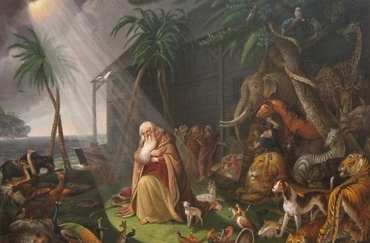1
And the heavens and the earth were completed, and all the army of them.
2
And on◦ the seventh day God completed His work▵* which He had made; and He ceased* on◦ the seventh day from all His work▵ which He had made.
3
And God blessed the seventh day, and made· it ·holy, because◦ in it He ceased from all His work▵ which God created to make.
4
These are the births of the heavens and of the earth when He created them, in the day in which Jehovah* God made the earth and the heavens.
5
And every shrub of the field was not··yet in the earth, and every herb of the field was not··yet growing, for Jehovah God had not caused it to rain on the earth. And there was no man to till the ground.
6
And He made a mist◦ to go··up from the land, and watered all the faces of the ground.
7
And Jehovah God formed man*, dust from the ground, and breathed into his nostrils the breath of lives*, and man became a living soul.
8
And Jehovah God planted a garden in Eden from the east, and there He set man whom He had formed.
9
And out··of the ground Jehovah God made to grow every tree desirable for seeing, and good for food; the tree of lives also, in the midst of the garden; and the tree of the knowledge of good and evil.
10
And a river went··out from Eden to water◦ the garden, and from thence it was separated, and was made* into◦ four heads.
11
The name of the first◦ is Pishon; it◦ surrounds all the land of Havilah, where there is gold.
12
And the gold of that◦ land is good; the bdellium and the onyx stone is there.
13
And the name of the second river is Gihon; it◦ surrounds all the land of Cush.
14
And the name of the third river is Hiddekel; it◦ is the one going◦ eastward··toward Assyria; and the fourth river, it◦ is Euphrates.
15
And Jehovah God took man, and placed him in the garden of Eden, to till it and to keep it.
16
And Jehovah God commanded man*, saying, Of every tree of the garden eating thou shalt eat.
17
But of the tree of the knowledge of good and evil, thou shalt not eat of it; for in the day that thou eatest of it, dying thou shalt die.
18
And Jehovah God said, It is not good that man should be alone; I will make for him a help as with him.
19
And Jehovah God formed out··of the ground every animal of the field, and every fowl of the heavens, and brought it to▵ man to see what he would call it; and whatever man called a living soul, that◦ was its name.
20
And man gave* names to every beast, and to the fowl of the heavens, and to every wild··animal of the field; but for man there was not found a help as with him.
21
And Jehovah God caused a deep··sleep to fall upon man, and he slept; and He took one of his ribs, and closed the flesh instead··of it.
22
And the rib which Jehovah God had taken from man, He built* into◦ a woman* and brought her to▵ man.
23
And man said, This one, this time◦ is bone from my bones and flesh from my flesh; for this she shall be called a wife, for this was taken out··of a man◦*.
24
Therefore shall a man◦ leave◦ his father and his mother, and shall cleave to his wife, and they shall become one flesh.
25
And the two of them were naked, man and his wife, and were· not ·ashamed.







